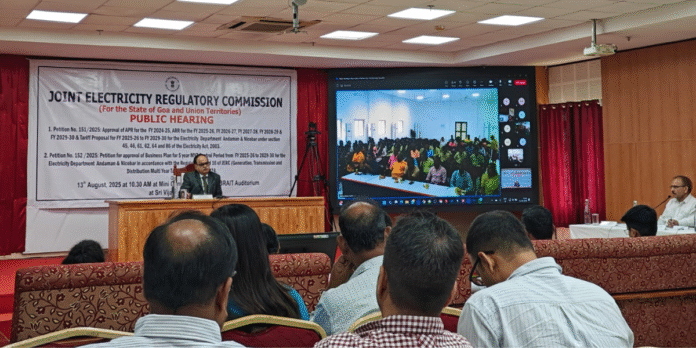The Joint Electricity Regulatory Commission’s (JERC) public hearing on the proposed electricity tariff hike turned into a sharp indictment of the Andaman and Nicobar Administration’s power sector policies, as residents, business leaders, activists, and political representatives demanded an immediate withdrawal of the proposal. The meeting, held at the DBRAIT Auditorium, saw repeated calls to prioritise public welfare over cost recovery, with many urging long-term investments in renewable energy rather than passing on departmental inefficiencies to consumers.
Speakers criticised the Electricity Department for what they described as years of poor planning, neglect, and failure to complete promised projects. “The department is projecting its incompetence onto the public,” one participant remarked, pointing to repeated shortfalls in capacity and service delivery.
Public representatives argued that given the islands’ geographical isolation, tariffs should be lowered rather than increased. With electricity rates in the islands already the highest among all Union Territories, touching ₹18 per unit, residents said the Administration was effectively penalising islanders for their location while expecting them to compete economically with other tourism-driven territories.
Business leaders said commercial establishments were already carrying an unfair burden for years, subsidising departmental inefficiencies. Advocates and social activists added that instead of using the Average Revenue Requirement (ARR) projections, such as the rise in fuel costs from ₹14.66 crore in 2025-26 to ₹19.61 crore in 2029-30 and the increase in power purchase costs from ₹60.93 crore to ₹63.43 crore over the same period, as justification for a hike, the Administration should invest in cutting fuel dependency entirely.
Participants recalled that hydropower, LNG, tidal, and wind projects had been floated over the years but never brought to completion. While the LNG plant has reportedly been approved, they noted that “groundwork and planning remain far from reality.” They accused the Administration of ignoring low-carbon energy opportunities while continuing to rely heavily on diesel gensets, contradicting the national push for green energy.
The Phase 2 expansion of the Kalpong hydropower plant was cited as another example of a project that had stalled without explanation. “There is no futuristic planning,” one speaker said. “The Administration cannot guarantee 24×7 power supply, yet it talks about raising tariffs.”
The central government’s PM Surya Ghar Muft Bijli Yojana, which provides subsidies for rooftop solar, also drew criticism. Residents said the average island household cannot afford the ₹3-4 lakh upfront cost, especially when subsidies are delayed. Without battery backup, solar systems are unreliable in the islands, which see rain for over seven months due to monsoon and cyclones.
A resident from Swaraj Dweep pointed to delays in receiving subsidies, prompting the JERC commissioner to direct the department to resolve the matter urgently.
Frequent voltage fluctuations damaging household appliances, unexplained spikes in smart meter readings, and reports of meters running even during outages were raised repeatedly. The commissioner instructed the department to conduct a case study on smart meters, publish its findings, and ensure transparency.
Speakers also criticised the poor maintenance of existing infrastructure, shortage of technical manpower, and a lack of accountability in responding to outages. “Bills are rising every month, but service is getting worse,” one participant said.
Several speakers questioned why the Administration could not utilise the central funds allocated to the islands for power sector improvements. “The government has enough funding,” one activist said. “If it is not used, the blame should not be shifted to the public through tariff hikes.”
Department’s Response
In response to commissioner queries, Chief Engineer Madhuri Shukla explained that a 5MW power plant hired under a Power Purchase Agreement had completed its tenure after seven years (including a four-year extension) and was no longer cost-effective. A new tender had been floated to replace it.
A 10MW genset in Bambooflat had been damaged and was undergoing repairs, expected to be completed by the end of August. Stopgap measures were being implemented, with overall stabilisation anticipated by November after the installation of the repaired genset.
On renewable energy, Shukla said the LNG plant was approved and NTPC had floated tenders. Solar subsidy delays were described as isolated to Swaraj Dweep. She acknowledged land encroachment as a hurdle for new connections but maintained that in normal circumstances, connections were released within 30 days.
While the department emphasised its temporary arrangements, many residents expressed frustration at what they saw as short-term fixes to a chronic problem. They urged the Administration to commit to a clear, time-bound plan for renewable generation, storage solutions, and upgrades to existing hydropower capacity.
Several participants also argued that diesel-based generation contradicted India’s climate commitments and exposed the islands to volatile fuel costs, which were now being used to justify tariff increases.
The hearing revealed not only dissatisfaction with the tariff proposal but also a deeper trust deficit between the public and the Electricity Department. Years of service issues, unfulfilled project promises, and perceived mismanagement have eroded confidence that additional revenue from a tariff hike would result in tangible improvements.
As one business owner summed it up: “If you can’t give us uninterrupted power with the current rates, why should we believe you can do it after raising them?”
The JERC is expected to take public feedback into account before issuing its final order on the tariff petition.






